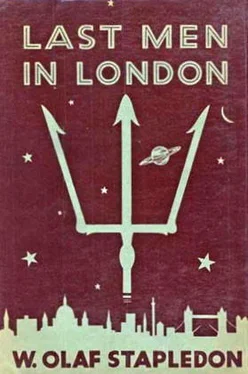In short, during this phase of his growth he was overwhelmed with what some would call a mystical apprehension of the inner being of all living things, and shocked by their insensitivity to one another, their essential harmfulness to one another. He was troubled by the fact that he himself ate meat and wore leather boots, and amazed that even kind-hearted persons, who doted on their own pets, did likewise without any hesitation. He was still more distressed by a streak of real sadism which survived in himself. At one time he used to catch wasps and cut them in two, so as to observe the strange behaviour of the parts. Worse still was his reaction to stag-hunting. His rare excursions into the world of sport did not occur until he was in his last year at school. They ceased while he was at the University. A well-to-do and much respected friend of his father sometimes invited Paul to spend part of the summer holidays at his house in Devon. He taught Paul to ride, and was determined to make a sportsman of him. When the lad was considered proficient, he was taken out to follow the hounds. With a sickening guiltiness, a sickening sense of his own bad horsemanship, with a sickening blend of adulation and contempt for the rest of the field, he let himself be bumped over moors and through covers, down lanes and through villages, till surprisingly he found himself in at the death. There at last was the stag, chin-deep in a river, or slithering on the roof of some outhouse in a village street, or more majestically at bay in the angle of two hedges. Then Paul exulted, even while he sickened with shame and pity. Why did he do it? he wondered. Why did he stand there watching the great weary beast mauled by the hounds, while the huntsmen tried to grab one of its antlers from behind? And when the knife went home, why did he feel, just for a fraction of a second, a sudden glee and triumph? Why was he so anxiously self-complacent as he stood at his horse’s head chewing cake and apples, while the stag was disembowelled and the hounds clamoured for their share? Why did he so desire to be taken for one of these sporting gentry, these overgrown schoolboys? These questions remained for Paul unanswered. Clearly his larval nature was making a desperate effort to reject the more developed mentality that I was forcing on him. In spite of his incompetence, he felt toward the sporting English gentleman not merely respect and envy but a deep kinship. In his revulsion against the primeval hunter and fighter, and aristocrat, he was divided against himself. Essentially the same conflict racked him a few years later when the war forced him to choose once and for all between the two allegiances. But of course in his war-perplexity, the primitive motive was reinforced by much that was by no means primitive.
Chapter 4
PAUL COMES OF AGE
I HAVE now to describe Paul’s advance from boyhood to early manhood, which he reached just before the outbreak of the European War. In order to do this I must tell chiefly of his changing reactions to three facts in his experience, namely to sex, to personality, and to the immense impersonal.
As I have already said, Paul discovered early in his childhood that a very special and delectable experience could be obtained from that part of his body on which his elders had conferred a most intriguing mystery. Their dropped voices, their hesitations, their veiled suggestions and warnings, had long ago roused his curiosity and prepared him to feel guilt in his new pleasure. Later, during adolescence, the natural development of his body, combined with the influence of stories and drawings circulated at school, increased his itch of experimentation in this field. His own sensitivity, which had been exaggerated by my influence, made him peculiarly susceptible.
In this new experience Paul found something unique, arresting, mysteriously significant, yet significant of he knew not what. I myself, the observer of these disturbing events, can only describe the character which he seemed to himself to find in them, by calling it an impression of almost mystical fulfilment, or of communion with some presence, or being, or power, wholly beyond the grasp of this intellect. It was as though he had unexpectedly discovered how to reach down and touch the deep, living heart of reality, and as though this contact were to quicken him through and through with an exquisite, though deadly thrill. The experience was all too brief, and after it came a vague fear. In the very act it seemed to be promising more than it could ever give. That fleeting contact with the heart of things was but an earnest, seemingly, of some more profound and lasting penetration, not yet to be achieved.
Now this attainment and this promise were not wholly illusory. To minds that have passed far beyond your stage of growth, every sensory experience whatever may afford this exquisite, inebriating sense of contact with objective reality. More primitive minds, however, seldom attain this insight. For them it is only when the sensuous has the added glamour of rarity, or of sin and sanctity, that it can deliver its full content. And so the amazed spirit falsely assumes that only through this one particular sensory window can it reach out and touch reality. Among you the sexual experience alone has universally this unique significance and power. For in you, as in the apes, almost alone among mammals, reproductive potency is constant and excessive. And in nearly all your cultures the consequent excessive interest in sex has been thwarted, in most cases very clumsily.
In Paul’s case it soon became clear that, unless I intervened, the mystery and horror with which sex was treated would cause in him an obsessive fascination. His plight is well enough expressed in a poem which he wrote at this time, but showed to no one. I should explain that henceforth he was frequently to indulge in what he regarded as poetical expression. I shall occasionally quote from his writings to illustrate his spiritual progress. Note that even at this early stage he was deserting the forms of verse that were still orthodox. Here is the poem.
SIN
I have touched filth.
Only with the finger tip I touched it,
inquisitive of the taste of it.
But it creeps.
It has spread over my body a slime
and into my soul a stupor.
It is a film over the eyes,
blurring the delicate figuring and ethereal hue of things.
It clogs the ears.
The finer tones of truth are muffled from me.
Beauty has turned her back on me.
I have shamed her, I am desolate.
There is no escape from myself.
And in my loneliness,
It was because of my mad loneliness,
I touched again.
I dabbled for a moment in the sweet filth.
and fled back shuddering in the silence.
Presently I shall slink down again and wallow.
for solace in my mad loneliness.
One of the most difficult facts for the Neptunian explorer to grasp about primitive minds is their obsession and their abject guilt and disgust in respect of bodily appetites. In the constitution of the last human species the excess energy of these appetites is very largely sublimated, innately, into the spiritual and intellectual life. On the other hand, whenever they do demand direct satisfaction, they are frankly and zestfully gratified. In Paul’s species it was the sexual appetite that caused trouble. Now it did not suit me that Paul should become tangled inextricably in sex. His whole generation, I knew, was going to develop along the lines of sex mania, in revulsion from the prudery of its predecessors. But it was necessary that Paul should maintain a true balance, so that his spirit’s energies should be free to direct themselves elsewhere.
The method by which I brought peace to Paul’s troubled mind was easy to me, though disturbing to him. Whenever he began to worry himself with guilty fears, I would force upon his imagination scenes from another world, in which not sex but nutrition was the deed of supreme uncleanness and sanctity. Little by little I pieced together in his mind a considerable knowledge of an early Neptunian species whose fantastic culture has many points in common with your own. Let me here tell you briefly of that culture.
Читать дальше












